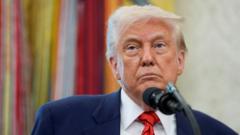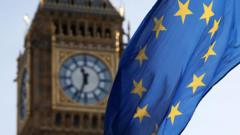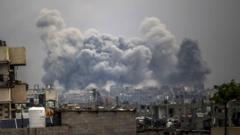Trump's upcoming discussions with global leaders may shift the trajectory of the war, as both nations have struggled to reach a consensus despite recent negotiations.
Trump Plans Call with Putin to Urge End to Ukraine Conflict

Trump Plans Call with Putin to Urge End to Ukraine Conflict
Former U.S. President Trump announces a high-stakes conversation with Vladimir Putin aimed at stopping the ongoing violence in Ukraine.
In a notable effort to curb the escalating conflict in Ukraine, former U.S. President Donald Trump has stated he will speak with Russian President Vladimir Putin on Monday at 10:00 EDT (14:00 GMT). This anticipated call focuses on halting the "bloodbath" associated with the ongoing war. Through a post on Truth Social, Trump expressed his intention to follow up with Ukrainian President Volodymyr Zelensky and leaders from various NATO nations.
The urgency of Trump's intervention follows a recent, inconclusive face-to-face negotiation between Russia and Ukraine in Istanbul, where, despite the absence of significant breakthroughs, both sides agreed on a prisoner swap. During this week, Trump extended an invitation to Putin to join him in Turkey for productive talks, yet the Russian leader declined.
In a series of statements, Trump has emphasized the necessity for direct communication with Putin, suggesting that real progress can only be achieved through their joint dialogue. He optimistically noted, "Hopefully it will be a productive day, a ceasefire will take place, and this very violent war, a war that should have never happened, will end."
NATO leaders continue to advocate for a 30-day ceasefire; however, Ukraine remains firm in its demand for a complete and unconditional halt to hostilities. Following the Istanbul talks, the head of the Russian delegation expressed satisfaction with the ongoing dialogue, indicating a willingness to continue engagements.
Tragically, hours after the negotiations, a Russian drone strike targeted a passenger bus in Ukraine’s Sumy region, resulting in nine fatalities. President Zelensky condemned the attack as a "deliberate killing of civilians" and called for more stringent sanctions against Russia. While Russian state media reported that the drone hit a "military staging area," the situation remains a critical flashpoint in the Ukraine conflict, which has been ongoing since Russia's full-scale invasion commenced in February 2022.
The urgency of Trump's intervention follows a recent, inconclusive face-to-face negotiation between Russia and Ukraine in Istanbul, where, despite the absence of significant breakthroughs, both sides agreed on a prisoner swap. During this week, Trump extended an invitation to Putin to join him in Turkey for productive talks, yet the Russian leader declined.
In a series of statements, Trump has emphasized the necessity for direct communication with Putin, suggesting that real progress can only be achieved through their joint dialogue. He optimistically noted, "Hopefully it will be a productive day, a ceasefire will take place, and this very violent war, a war that should have never happened, will end."
NATO leaders continue to advocate for a 30-day ceasefire; however, Ukraine remains firm in its demand for a complete and unconditional halt to hostilities. Following the Istanbul talks, the head of the Russian delegation expressed satisfaction with the ongoing dialogue, indicating a willingness to continue engagements.
Tragically, hours after the negotiations, a Russian drone strike targeted a passenger bus in Ukraine’s Sumy region, resulting in nine fatalities. President Zelensky condemned the attack as a "deliberate killing of civilians" and called for more stringent sanctions against Russia. While Russian state media reported that the drone hit a "military staging area," the situation remains a critical flashpoint in the Ukraine conflict, which has been ongoing since Russia's full-scale invasion commenced in February 2022.





















